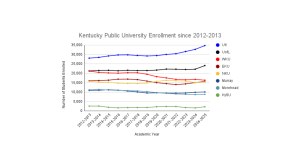SGA official: Tobacco ban would infringe upon WKU students’ rights
October 28, 2011
The Sept. 13 Student Government
Association decision to pass a resolution supporting a campus-wide
ban on all tobacco products comes with a catch — WKU must first
lift the housing contract that requires freshmen and sophomores to
live in dorms.
Kaylee Egerer, speaker of the SGA
Senate, said she never expects the Board of Regents to enact the
SGA’s version of the proposed tobacco ban because the housing
requirement is such a key factor.
However, Egerer said the SGA needed
to link the tobacco and housing resolutions together because it is
“infringing on students’ rights” if it requires students who use
tobacco products to live on a campus that is
tobacco-free.
“A tobacco ban is totally unfair and unrealistic,”
Egerer said. “When the bill was drafted, it wasn’t asking for the
housing requirement to be lifted, but in order for there to ever be
any support from the students for a tobacco ban, then they can’t be
required to live on campus.”
Brian Kuster, director of Housing and Residence Life,
said the SGA resolution is impossible with WKU’s financial
situation.
The financial model the Student Life Foundation
adopted before renovating all of the dorms in the past decade
requires them to be at capacity in order to repay bondholders,
Kuster said.
“We have a $78 million debt on the residence halls,
so we need to keep them full,” he said. “It takes money to do and
upkeep the kind of renovations that we have.”
Kuster also said WKU requires freshmen and sophomores
to live on campus because it aids in retention.
“We have research here of our own
here at the university that students that live here on campus
graduate at a higher rate than students that don’t,” Kuster said.
“They stay in school at a higher rate than students that don’t live
on campus, so there’s educational value to it.”
President Gary Ransdell has said the passage of the
tobacco ban would require approval from not just SGA, but the
University Senate and Staff Council as well. Ransdell even visited
the SGA meeting on Oct. 4 to clarify WKU’s position on the
necessity of its on-campus housing requirement.
Ransdell said WKU is taking steps to
ensure that students who wish to live on campus — upperclassmen and
underclassmen — can do so in the future.
“What we’re doing is building more residence halls
for upper-class students which will open up beds for incoming new
students,” Ransdell said in reference to future apartment-style
dorms on Kentucky Street.
Kuster said many of the complaints against the
requirement should really be addressed to the students themselves,
particularly upperclassmen holding onto campus housing contracts
through much of the summer.
“That’s why we end up in the summer time in a crunch
because we’ve got students that say they’re going to live on campus
and then decide not to at the last minute,” Kuster said. “We have
more and more students that wait and make a decision later on and
holding a space that we can’t give to an incoming student.”
Though the SGA resolution does include the housing
requirement, Egerer said the resolution was not intended to develop
a position for or against the requirement itself.
“We understand why that requirement is in place
because WKU has a lot of ground to cover to reimburse the debt that
comes from renovating residence halls,” Egerer said.
“Students live on campus. It doesn’t make sense to
tell somebody, ‘You have to live on campus for two years — you have
to — but you can’t use tobacco when you’re of age.’”

















